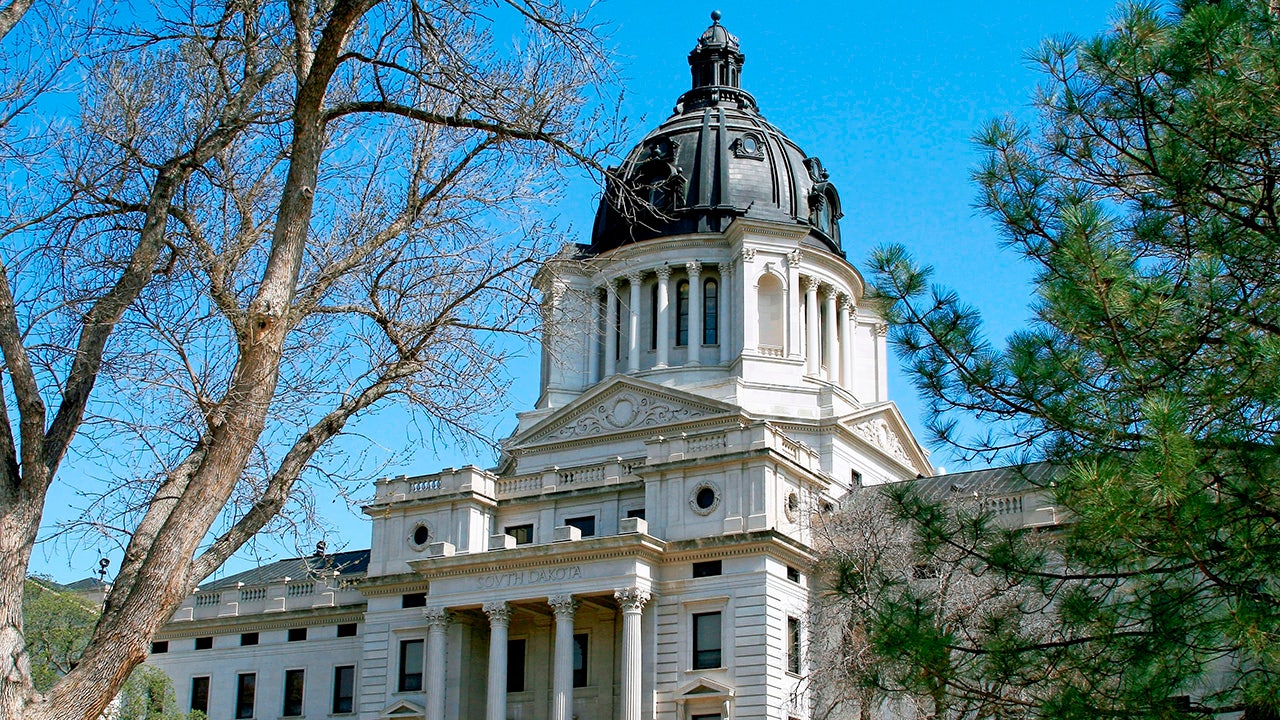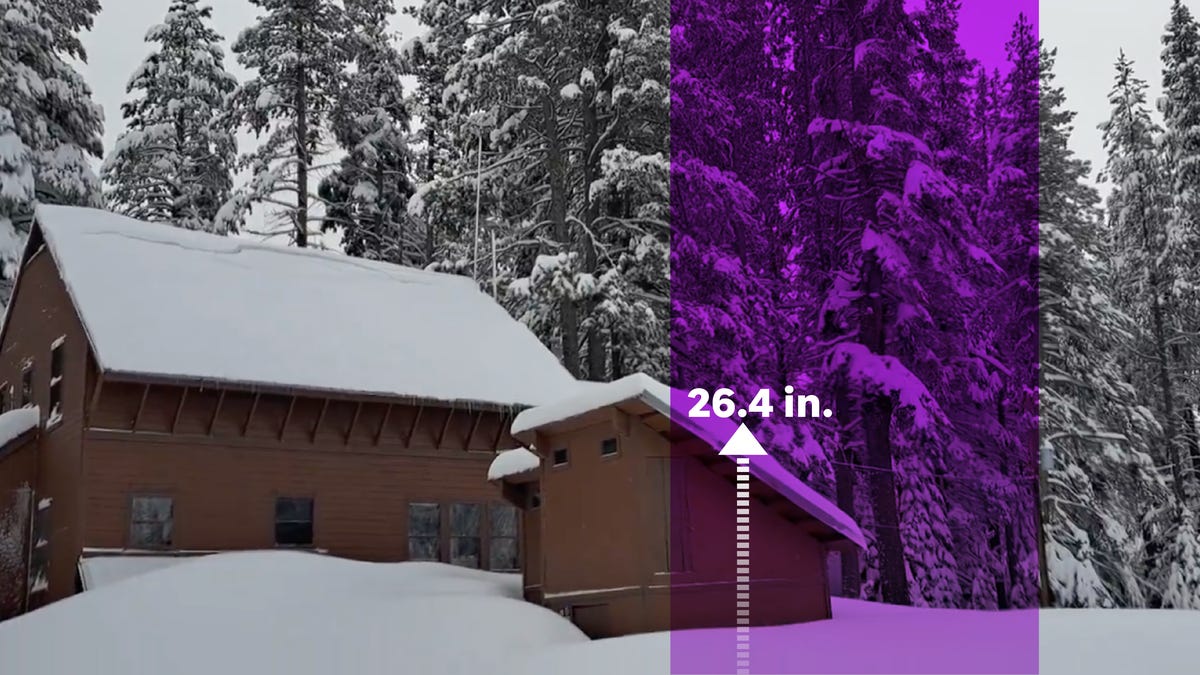Southeast
Proposal to let parents be fined for kids' crimes heads to Tennessee governor's desk
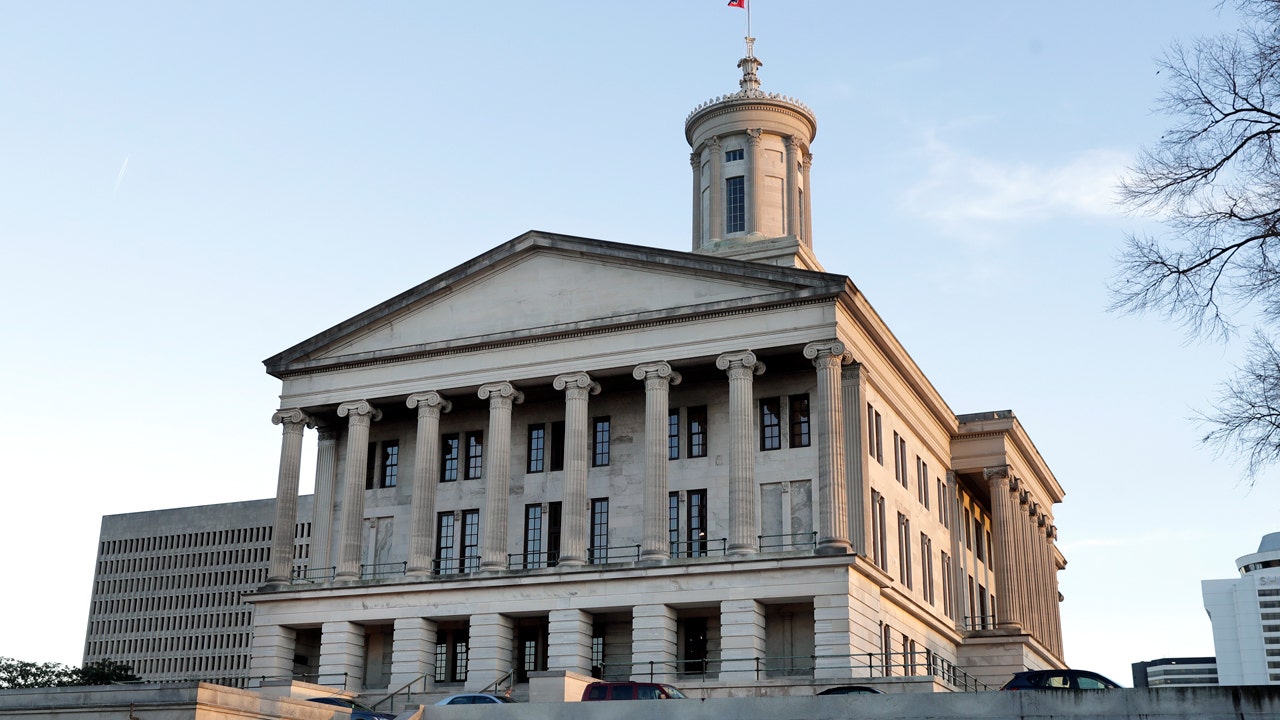
A proposal that would allow parents to be fined for their child’s criminal offenses is headed to Tennessee Gov. Bill Lee’s desk for his approval.
The GOP-dominant House on Monday approved allowing judges to levy up to $1,000 in fines against parents or legal guardians of children who commit a second criminal offense. The chamber voted 72-24 to send the bill to the governor after it previously secured the support from the similarly Republican-controlled Senate.
TENNESSEE SCHOOL VOUCHER PROGRAM PLANS COME TO AN END AFTER GOV. LEE ADMITS DEFEAT
Supporters argue the proposal is needed to hold families accountable for the child’s actions. However, Democratic lawmakers warned that the bill unfairly targets working parents who may have limited resources and burden them with fines that they may be unable to pay.
The Tennessee Capitol is seen, Jan. 8, 2020, in Nashville, Tenn. Republicans in the Tennessee House and Senate both plan to offer businesses new tax help worth upward of $1 billion, Friday, March 29, 2024. (AP Photo/Mark Humphrey)
“We’re not going to solve this problem by criminalizing parents doing the best that they can,” said Democratic Rep. John Ray Clemmons.
According to the legislation, dubbed the “Parental Accountability Act,” judges would be allowed — but not required — to order parents pay restitution for law enforcement expenses for responding and investigating their child’s criminal offense. If the parents or legal guardians are unable to pay, the judge could order them to perform community service instead.
“All were trying to do is create a mechanism for a judge to exercise and allow these parents to be better held accountable,” said Republican Rep. John Gillespie, who sponsored the legislation.
While debating the bill, Gillespie said that state officials had assured him that the legislation would not apply to foster care parents. Democrats questioned that stance and asked the Republican to make a last-minute tweak to explicitly exempt foster care families but Gillespie refused.
Lee, a Republican, hasn’t publicly stated whether he supports the measure.
Read the full article from Here

Southeast
United Methodist Church abolishes LGBTQ bans, 'last of the major mainline groups to liberalize'
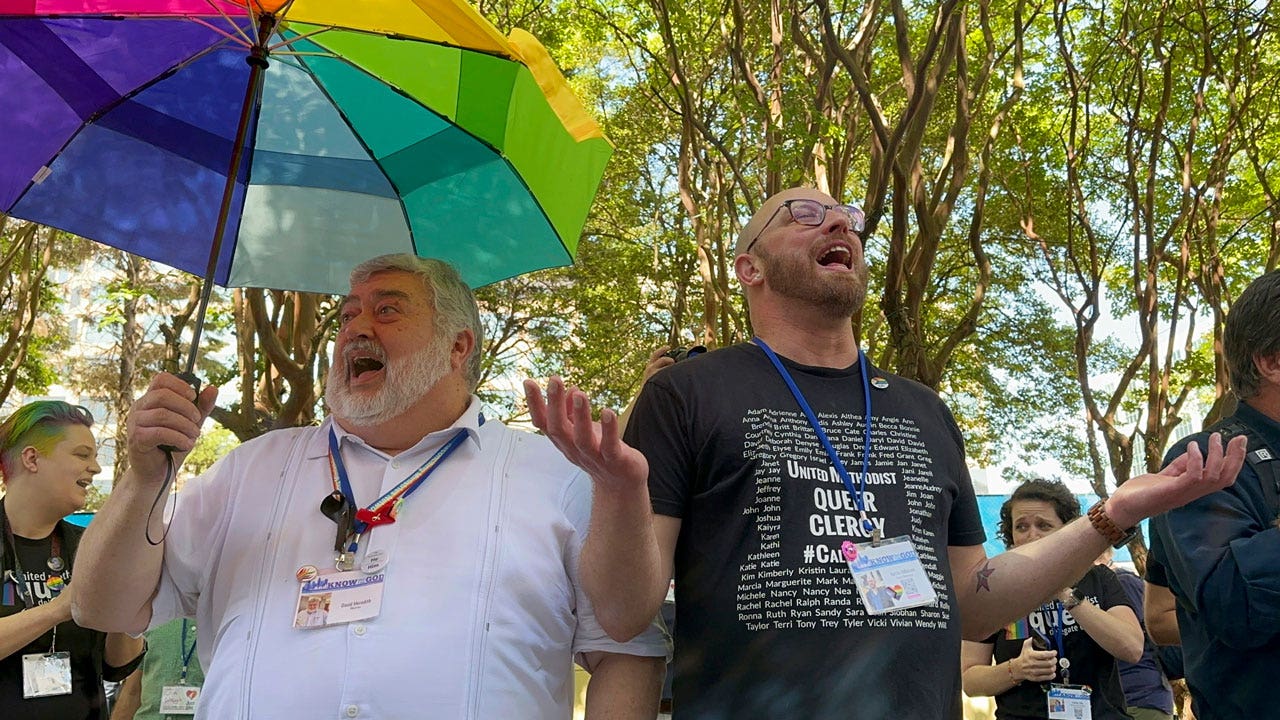
It took just a few days for United Methodist delegates to remove a half-century’s worth of denominational bans on gay clergy and same-sex marriages.
But when asked at a news conference about the lightning speed of the changes, the Rev. Effie McAvoy took a longer view.
“Oh, it didn’t take days, honey,” she said.
UNITED METHODIST CHURCH VOTES TO LIFT BAN ON LGBTQ CLERGY, MARKING HISTORIC POLICY SHIFT
It took decades of activism for a change that was “so very healing,” said McAvoy, pastor of Shepherd of the Valley United Methodist Church in Hope, Rhode Island. A member of the Queer Delegate Caucus at last week’s UMC General Conference in Charlotte, she was grateful to be part of the historic moment.
The reversals can be seen as marking the end of a half-century of epic battles and schisms over LGBTQ involvement — not only in the United Methodist Church but in U.S. mainline Protestant denominations overall. Those are the tall-steeple churches in myriad town squares and rural crossroads, traditionally “big-tent” and culturally mainstream congregations — some predating America’s independence.
The nation’s largest Methodist, Presbyterian, Episcopal and Lutheran denominations have all now removed barriers to LGBTQ participation in the pulpit and at the altar. But this comes amid long-term declines in membership and influence.
The Rev. David Meredith, left, and the Rev. Austin Adkinson, right, sing during a gathering of those in the LGBTQ community and their allies outside the Charlotte Convention Center, in Charlotte, North Carolina, on May 2, 2024. When the United Methodist Church removed anti-LGBTQ language from its official rules in recent days, it marked the end of a half-century of debates over LGBTQ inclusion in mainline Protestant denominations. (AP Photo/Peter Smith, File)
Surely there will be skirmishes to come. Individual congregations, and entire regions across the world, will sort out the implications. Controversies have grown among some conservative evangelical churches and colleges, which largely avoided past battles.
But for mainline Protestants, last week’s General Conference looks like a landmark. It was a relatively quiet coda to what had been an almost annual scene on America’s religious calendar — impassioned showdowns at legislative assemblies of Protestant denominations, marked by protests, political maneuverings and earnest prayers.
Across the decades, there were many cases of ecclesiastical civil disobedience — clergy doing ordinations and marriages that defied church bans, some of whom were tried for heresy or other infractions.
“A part of me still doesn’t believe it,” said the Rev. Frank Schaefer, one of the last United Methodist ministers to face church discipline after presiding at the same-sex wedding of his son. Schaefer was restored to ministry in 2014 by a Methodist appellate panel after a lower tribunal had defrocked him.
“We’ve fought for it so long and hard, and there were so many disappointments along the way,” said Schaefer, now a pastor in California. “Our tears have turned into tears of joy.”
But the UMC faces the same dire challenges as Lutheran, Presbyterian, Episcopal and smaller mainline denominations that took similar routes.
All lost large numbers of congregations in schisms, and they have had to navigate fraught relations with partner churches in Africa and elsewhere.
Retired United Methodist Bishop Will Willimon, a professor at Duke Divinity School, supported greater LGBTQ inclusion in the church — but said bigger issues loom.
“We’re an aging denomination,” he said. “We share that with so many mainline denominations. Unfortunately I don’t see how this vote addresses any of that.”
Willimon said even conservative breakaway groups like the new Global Methodist Church, comprised of many former UMC congregations, face similar challenges with predominately white, aging memberships.
In the U.S., mainline churches have lost millions of members since their peak in the 1960s — some to schism and many to underlying demographics. Their members are aging and don’t have many children, and they struggle to retain the children they do have, said Ryan Burge, associate professor of political science at Eastern Illinois University.
“There is no silver bullet” for reversing mainline decline, said Burge, who studies religious demographics.
The United Methodists counted 5.4 million U.S. members in 2022 — less than half their 1960s peak, and the recent departure of about 7,600 mostly conservative congregations will lower that number further. The Presbyterian Church (U.S.A.)’s 1.1 million membership is barely a quarter its 1960s peak. Other denominations have similar trends.
The mainline battles over LGBTQ issues began heating up in the early 1970s, before those initials were used.
A United Methodist General Conference in 1972 declared homosexual practice “incompatible with Christian teaching.” Other denominations issued similar teachings. Some imposed explicit bans on gay clergy.
An Episcopal bishop was tried and acquitted of heresy in 1996 for ordaining a gay pastor. The 2003 ordination of the first openly gay Episcopal bishop, Gene Robinson, ignited long-simmering controversies.
Conservative and liberal groups formed their own church caucuses for denominational legislative sessions, where Scriptures and slogans flew back and forth between proclamations of Robert’s Rules of Order.
Progressive Presbyterians blocked an entrance to a General Assembly in 2000 and were arrested. As the United Methodists steadily tightened LGBTQ bans, progressives disrupted General Conferences with protests, drums and songs. A conservative United Methodist leader, the Rev. Bill Hinson, roiled the 2004 General Conference in Pittsburgh with a call for denominational divorce — even though his side had won all its legislative battles.
“Why do we go on hurting each other?” asked Hinson. Others quickly tamped down the idea, but it was a foreshadowing.
By the second decade of the 21st century, Presbyterians, Lutherans and Episcopalians had largely dismantled their bans. They navigated major strains with partner churches elsewhere in the world.
Substantial minorities of their U.S. congregations joined more conservative denominations, saying the sexuality debates were symptoms of a deeper theological chasm.
The United Methodist Church is unique because it is international, with many delegates from countries with conservative sexual values and laws. A special legislative session in 2019 reinforced LGBTQ bans.
That result proved short-lived.
U.S. churches increasingly defied the bans and elected more progressive delegates for this year’s gathering. Many churches began disaffiliating under a temporary measure approved in 2019 that let churches keep their properties under favorable conditions.
To Willimon, that process was devastating. Whether the congregation stayed or left, peoples’ relationships were ruptured, he said.
Many churches went independent, but thousands joined the new Global Methodist Church, which pledges to enforce restrictions on LGBTQ clergy and same-sex marriage.
Now attention turns to Africa, where the UMC counts 4.6 million members.
One group of African delegates protested outside the General Conference and said their members would discuss whether to disaffiliate.
“The General Conference did not listen to us,” said the Rev. Jerry Kulah of the conservative group, Africa Initiative, contending the denomination departed from biblical teaching on marriage. “We do not believe we know better than Jesus.”
Bishop John Wesley Yohanna of Nigeria said he would likely leave the denomination after his term ends, though he is staying for now to help heal a rift in the local church. “From the tradition of the church in Africa,” he added, “marriage is between a man and a woman, period.”
But other African delegates are heartened by a plan that expands regional autonomy on such matters. They said African churches will keep the marriage and ordination bans in their region while remaining in the denomination.
“Our decision to stay in the United Methodist Church is not conditioned by what happens in America,” said the Rev. Ande Emmanuel of Southern Nigeria. “God has called us to a church, and the church is not a property of the United States.”
Bishop Eben Nhiwatiwa of Zimbabwe the majority of the African bishops at General Conference agree the regionalization plan respects local cultures.
The United Methodist Church was the last of the major U.S. mainline groups to liberalize its policies on sexuality in part because of its large presence in rural, small-town and Southern areas, where a more conservative sexual ethos prevails, said James Hudnut-Beumler, a professor of American Christian History at Vanderbilt University. He is a Presbyterian Church (U.S.A.) minister and co-author of “The Future of Mainline Protestantism.”
“That’s why they’re the last to go,” he said.
And it won’t automatically bring back the more-accepting younger generations who left over the bans, said Hudnut-Beumler, adding that conservative evangelical congregations are not exempt.
“Some conservative megachurch pastor may be thinking to himself, ‘We won this. Look what happened to the Methodists and Presbyterians and Episcopalians,’” said Hudnut-Beumler, “Don’t be so smug.”
Read the full article from Here
Southeast
Rolling Stones' Mick Jagger claims Louisiana governor 'trying to take us back to the Stone Age'

Rolling Stones’ frontman Mick Jagger ignited a small feud between himself and the Louisiana governor on Thursday while performing in the state.
The 80-year-old British singer and his band performed at the New Orleans Jazz & Heritage Festival to a sold-out show. After finishing the song “You Can’t Always Get What You Want,” Jagger called out Gov. Jeff Landry by name.
“We’re a welcoming crowd, aren’t we?” Jagger asked. “I hope Mr. Landry is enjoying the show. He’s real inclusive you know. He’s trying to take us back to the Stone Age.”
NEW ORLEANS, LOUISIANA – MAY 02: (L-R) Steve Jordan, Keith Richards and Mick Jagger of the Rolling Stones perform on Day 5 of 2024 New Orleans Jazz & Heritage Festival at Fair Grounds Race Course on May 02, 2024 in New Orleans, Louisiana. (Photo by Erika Goldring/Getty Images)
LOUISIANA WILL FORM A NEW CITY OF ALMOST 100,000 PEOPLE AFTER BATTLE MADE IT TO STATE SUPREME COURT
Shortly after the comment, the Republican governor responded on social media, appearing to mock the singer as well.
“You can’t always get what you want,” he posted on X. “The only person who might remember the Stone Age is Mick Jagger. Love you buddy, you’re always welcome in Louisiana! #LoveMyCountryMusic.”
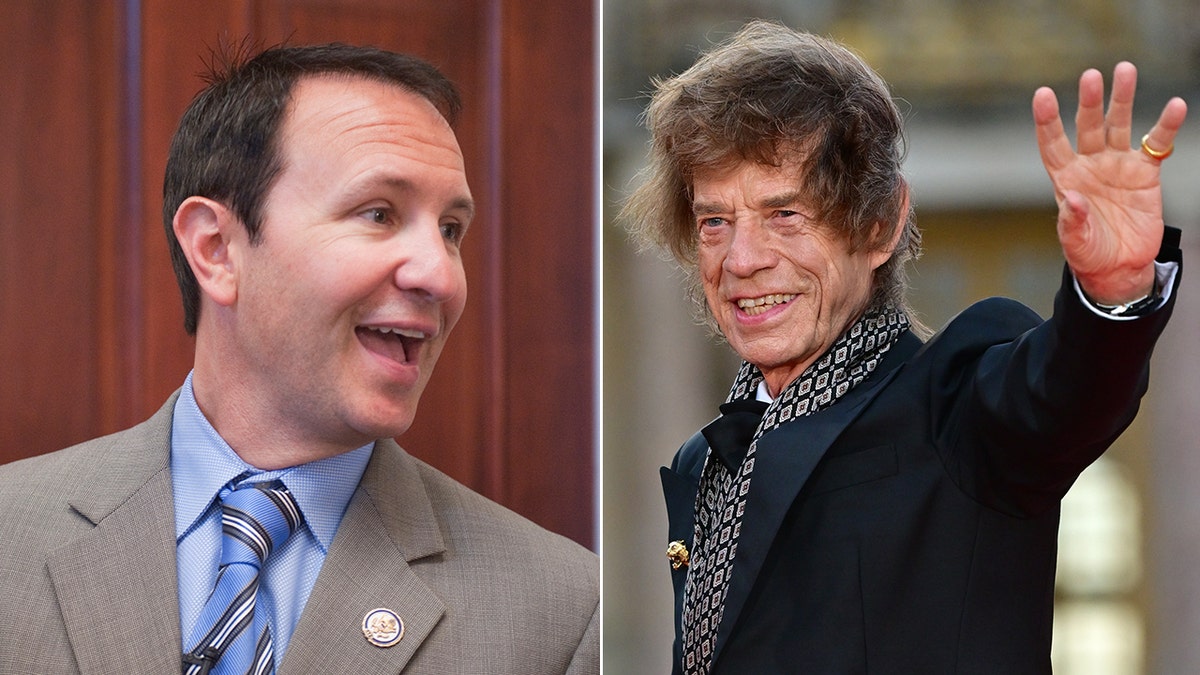
Gov. Jeff Landry later responded to Mick Jagger on X. (Photo By Bill Clark/Roll Call/Photo by Christian Liewig – Corbis/Corbis via Getty Images)
MICK JAGGER CELEBRATES 80TH BIRTHDAY WITH GIRLFRIEND AND FORMER LOVE PLUS LEONARDO DICAPRIO, LENNY KRAVITZ
Though Jagger did not elaborate, Landry has supported several conservative policies since his inauguration in January, such as enacting more tough-on-crime legislation and enshrining Constitutional Carry into law.
Landry also indicated that he would support bills that were previously vetoed by former Gov. John Bel Edwards, a Democrat, such as one that would prohibit gender identity discussion in K-12 public schools and require teachers to inform parents about students changing their pronouns.
Though Landry might get away with referencing the iconic “You Can’t Always Get What You Want,” not all politicians have escaped scrutiny. In 2016, the band demanded then-candidate Donald Trump stop using the song, during campaign rallies, as well as “Start Me Up.”
When he continued to use the song in 2020, the band finally demanded legal action in partnership with BMI, a performing arts rights organization.

The Rolling Stones previously demanded their song “You Can’t Always Get What You Want” stop being played at Trump rallies. (Sven Hoogerhuis/BSR Agency/Getty Images)
“The BMI have notified the Trump campaign on behalf of the Stones that the unauthorized use of their songs will constitute a breach of its licensing agreement,” said the statement. “If Donald Trump disregards the exclusion and persists then he would face a lawsuit for breaking the embargo and playing music that has not been licensed.”
Read the full article from Here
Southeast
Biden admin’s DOE investigating Emory University for alleged anti-Muslim discrimination
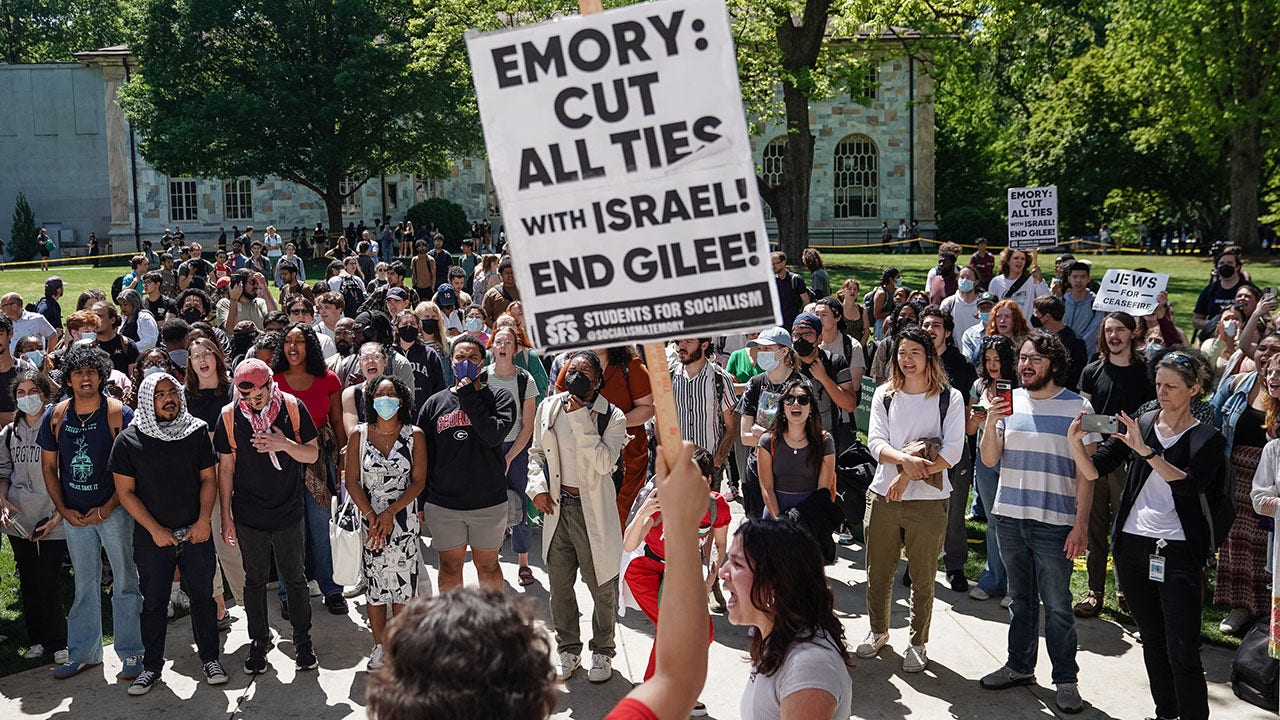
The U.S. Department of Education’s (DOE) Office for Civil Rights is investigating Atlanta’s Emory University for alleged anti-Muslim discrimination on campus.
The investigation comes as college campuses across America are being engulfed by disruptive, chaotic and often violent anti-Israel protests — leaving many Jewish students with no choice but to flee campus or fear for their safety.
The DOE’s investigation comes after the Georgia chapter of the Council on American-Islamic Relations (CAIR-Georgia) and Palestine Legal filed a civil rights complaint against the school on behalf of Emory Students for Justice in Palestine.
The groups claim that Palestinian, Arab and Muslim students have been called “terrorists,” “fake Muslims” and endured severe harassment, intimidation and discrimination on campus and online. It claims students had their flyers, noting the number of Palestinians killed by Israeli forces, ripped down or thrown in the trash.
LIVE UPDATES: POLICE ARREST THOUSANDS AT COLLEGES ACROSS THE US TO CLEAR ANTI-ISRAEL PROTESTS, ENCAMPMENTS
Students chant during an anti-Israel protest at Emory University on April 25 in Atlanta. (Elijah Nouvelage/AFP via Getty Images)
“The last 6 months at Emory University have been difficult for Palestinian, Arab and Muslim students. We want the Department of Education to do what Emory failed to — which is [to] investigate our reports of bias properly, listen to our voices, and hold Emory accountable, so we can safely advocate for Palestinian rights without fearing for our safety on campus,” Emory Students for Justice in Palestine said in a release from CAIR-Georgia about the complaint. “No student should ever feel marginalized, intimidated and unsafe like we have been feeling. We are here to learn, and we should be able to do so in peace without being threatened, harassed and dox[x]ed simply for being Palestinian, Muslim, Arab or a supporter of Palestinian rights.”
When reached by Fox News Digital, Emory University said it received the complaint from the DOE and will respond, but said it is unable to discuss an open investigation.
EMORY UNIVERSITY POLICE ARREST CONVICTED FELON WHO CROSSED STATE LINES TO JOIN ANTI-ISRAEL PROTESTS
Similarly, the DOE confirmed the investigation, but told Fox News Digital it “does not comment further on pending investigations.”
CAIR-Georgia — a group whose main chapter top executive said he was “happy” to witness the Oct. 7 terrorist attack on Israel — praised the DOE’s investigation into Emory.
“It is unconscionable that students have been made to suffer an unsafe and unwelcome learning environment without recourse despite asking the University for help multiple times,” Azka Mahmood, CAIR-Georgia’s executive director, said in a press release. “We hope that this investigation will compel Emory University administration to address the harassment and systemic discrimination faced by Palestinian, Muslim, and Arab students.”
The DOE’s investigation into anti-Muslim discrimination comes as students and outside agitators have staged often-violent anti-Israel encampments at universities across the U.S.
ANTI-ISRAEL STUDENTS AT EMORY UNIVERSITY BASH BIDEN, AVOID OUTRIGHT CONDEMNING OCTOBER 7
At Emory, at least 28 people were arrested during a recent demonstration at the Emory Quad. The school said its Police Department “issued criminal trespass warnings to six individuals suspected of committing recent acts of vandalism on campus” and “confirmed that none of these individuals are affiliated with Emory.”
Video taken on campus showed police officers armed with Tasers, tear gas and pepper balls attempting to bring the rowdy anti-Israel agitators under control.
Former FBI Special Agent and Fox News contributor Nicole Parker said the DOE investigating alleged anti-Muslim discrimination on Emory’s campus and not antisemitism is just par-for-the-course with the current federal criminal justice system under the Biden administration.
“It seems that when it comes to investigating members of the liberal progressive movement, the FBI and DOJ almost turn a blind eye,” Parker told Fox News Digital. “But yet they drop the hammer on those on the conservative end of the spectrum.”
Parker stressed that she cannot speak about the DOE, but said the federal criminal justice system in general “picks and chooses who they are going to protect.”
“The FBI claims that the violent and dangerous actions against Jews on college campuses the past couple of weeks are simply an exercise of First Amendment rights,” Parker said. “If those activities don’t constitute violation of civil rights or a hate crime — I’m not sure what a hate crime is.”
She pointed to the FBI’s definition of a hate crime. On its website, the FBI defines a hate crime as a “criminal offense against a person or property motivated in whole or in part by an offender’s bias against a race, religion, disability, sexual orientation, ethnicity, gender, or gender identity.”
COLLEGES CLAIM NOT ALL PROTESTERS GETTING ARRESTED ARE PART OF THEIR SCHOOL COMMUNITIES
When previously reached by Fox News Digital about the anti-Israel and often blatant antisemitic demonstrations on college campuses, the FBI released the following statement:
“The FBI is in close contact with state and local law enforcement partners and, as we do in the normal course of business, we will share any information regarding potential threats. We respect the rights of individuals to peacefully exercise their First Amendment rights and the FBI investigates individuals who violate federal law through violence or other criminal activity.”
Parker encouraged any students who feel they have been the victim of a hate crime to contact the FBI by calling 1-800-CALL-FBI or submit a tip online at tips.fbi.gov.
She said “hold them accountable.”
“First amendment free speech is embraced in our blessed nation, but violence, terroristic threats and destruction are not. In fact, those are serious crimes and should be prosecuted to the fullest extent of the law,” she said.
Fox News Digital reached out to Emory Students for Justice in Palestine, but has not yet heard back.
Fox News Digital’s Greg Norman and Timothy Nerozzi contributed to this report.
Read the full article from Here
-

 News1 week ago
News1 week agoBoth sides prepare as Florida's six-week abortion ban is set to take effect Wednesday
-

 Politics1 week ago
Politics1 week agoColumbia University’s policy-making senate votes for resolution calling to investigate school’s leadership
-

 Politics1 week ago
Politics1 week agoGOP Rep. Bill Posey won't seek re-election, endorses former Florida Senate President as replacement
-

 World1 week ago
World1 week agoBrussels, my love? MEPs check out of Strasbourg after 5 eventful years
-

 World1 week ago
World1 week agoRussian forces gained partial control of Donetsk's Ocheretyne town
-

 Politics1 week ago
Politics1 week agoHouse Republicans brace for spring legislative sprint with one less GOP vote
-

 World1 week ago
World1 week agoAt least four dead in US after dozens of tornadoes rip through Oklahoma
-

 Politics1 week ago
Politics1 week agoAnti-Trump DA's no-show at debate leaves challenger facing off against empty podium

/cdn.vox-cdn.com/uploads/chorus_asset/file/25436323/Super_Famicom_prototype.jpeg)

